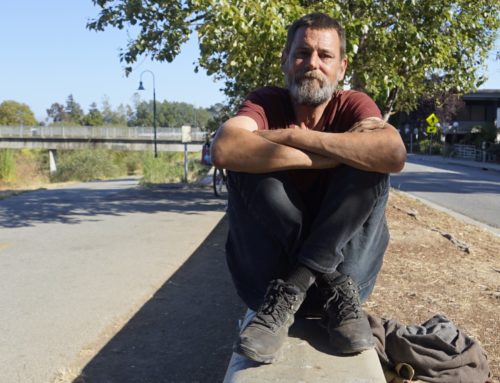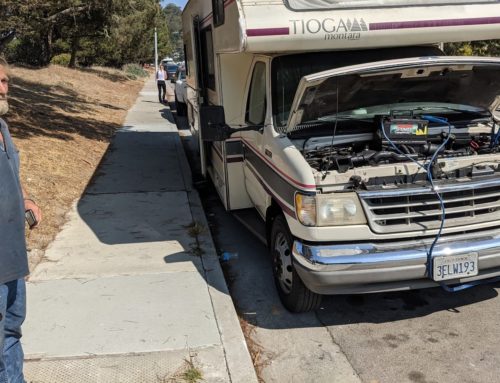Santa Cruz County public schools are shut down through the end of the academic year, to limit the spread of the coronavirus. Families, teachers and school administrators have been forced to adapt quickly. Santa Cruz Local co-hosts Stephen Baxter and Kara Meyberg Guzman focus on two questions: What’s working for students and parents with distance learning? And what can we do to help kids get comfortable with the new normal?
TRANSCRIPT
Editor’s note: Transcripts are usually only available to members. We offer coronavirus-related transcripts for free, as a public service.
KARA MEYBERG GUZMAN: This episode is sponsored by Santa Cruz Works, your connection to our area’s thriving tech and business community. With over 5,000 members, Santa Cruz Works gives you access. The largest monthly tech events. Solutions for your startups and businesses. Connections to the hottest jobs. And the latest news about local companies: their stories, and best practices. Subscribe free to the Santa Cruz Works weekly newsletter today. santacruzworks.org/podcast
[MUSIC TRANSITION]
NOLAN HAINES: My name is Nolan Haines. I am 17 years old and I go to Soquel High School.
I’m a senior. It’s been a big adjustment. It’s been a little depressing. Because you’re starting to realize that all these things you’ve been expecting your whole life were like, being taken away.
Our prom is being taken away now. I might have to get a diploma over, over email. That sucks. And yeah, I might have to plan something out with my friends in the future like to make up a problem like a night out, you know, dressed all nice over the summer.
SB: For Nolan Haines and the Class of 2020, the coronavirus has cast a shadow on all the last hurrahs of high school.
Nolan loves acting and singing. He’s even hoping for a career in it. He’s frustrated. His final high school musical, “Rent,” has been canceled. He says his jazz choir is a joke over Zoom.
NOLAN HAINES: I have to record myself with like a karaoke track in the background or an instrumental version. And then I have to send it to her over Google Classroom. And then I have to re-sing it live to the whole class over Zoom.
And that’s that’s been really tough because none of us can hear each other and it’s very laggy. And it cuts out a lot, yeah.
SB: I’m Stephen Baxter.
KMG: And I’m Kara Meyberg Guzman.
SB: This is Santa Cruz Local.
SB: Nolan’s story is just one of the dozens we heard over the past week. Teachers, parents, kids — all of them suddenly thrust into this new world of online distance learning.
With our stories over the next few weeks, we want to talk about solutions. We want to shine a light on what’s working. For this episode, we tackled two questions:
What’s working for students and parents with distance learning?
And what can we do to help kids get comfortable with the new normal?
These two questions were inspired by the Solutions Journalism Network. They’re trying to get newsrooms to not just report on the problems, but focus on the solutions.
KMG: What we heard were anecdotal successes. We don’t have hard evidence. Everyone’s figuring it out as they go. We kept hearing from teachers, “We’re building the airplane while it’s in the air.”
But we think they’re worth hearing. Maybe you can pick up parts for your own family.
But first, let’s hear from two parents about their challenges.
[AMBI OF JO FLEMING GREETING KARA, DOG BARKING]
Here’s Jo Fleming. Jo works has been working from home during the lockdown.
She has two kids: Ollie, a high school sophomore in Scotts Valley. Hannah, a sophomore at UCLA. Hannah is immune compromised. She’s home early from school. I interviewed all of them over her back fence. I wanted to give them ample distance.
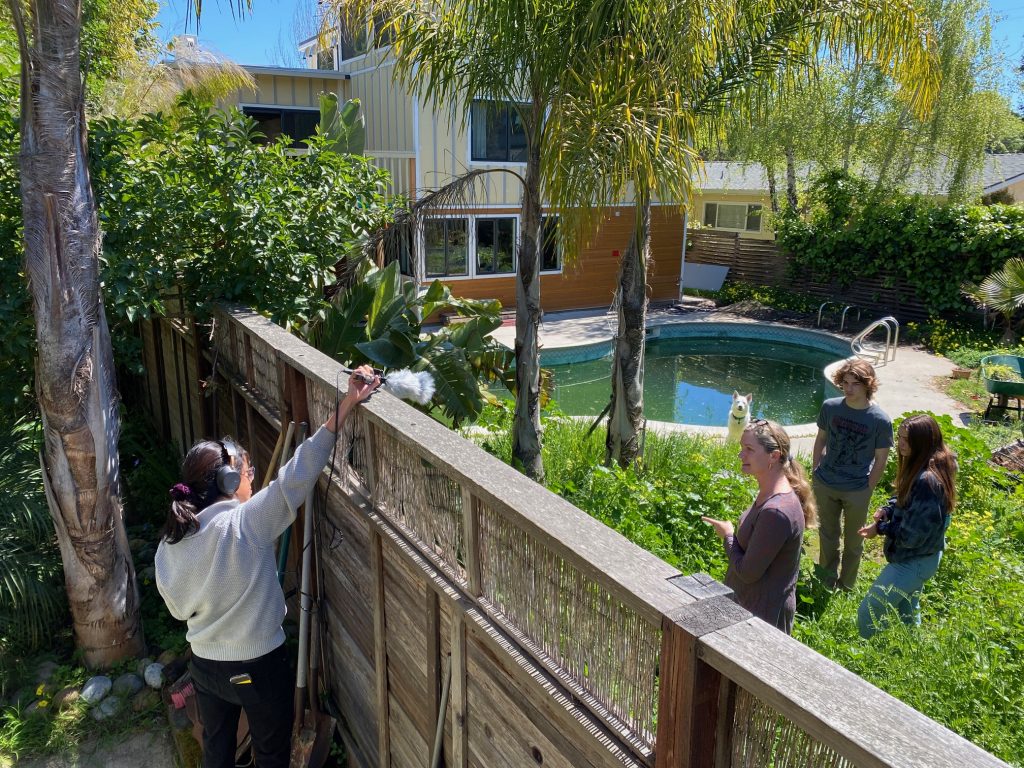
JO FLEMING: We’re, we’re in our best isolation clothes, which means like, we put on our clean pajamas. [LAUGHS.]
Oh, look at Jedi [the dog.] He’s just watching us. [Laughs.]
So that’s been our story. Um. I’m lucky enough that I can work from home and so is my team. And so, my husband has been sick since day one. And so he’s been isolated — Kai’s been isolated downstairs. Just because you know, we have immune compromised issues going on.
And so we’ve been bringing him meals and it’s hard not to have that person with me. And especially for him too, I’m sure, but he’s got like a nasty cough and so we’re just keeping him isolated.
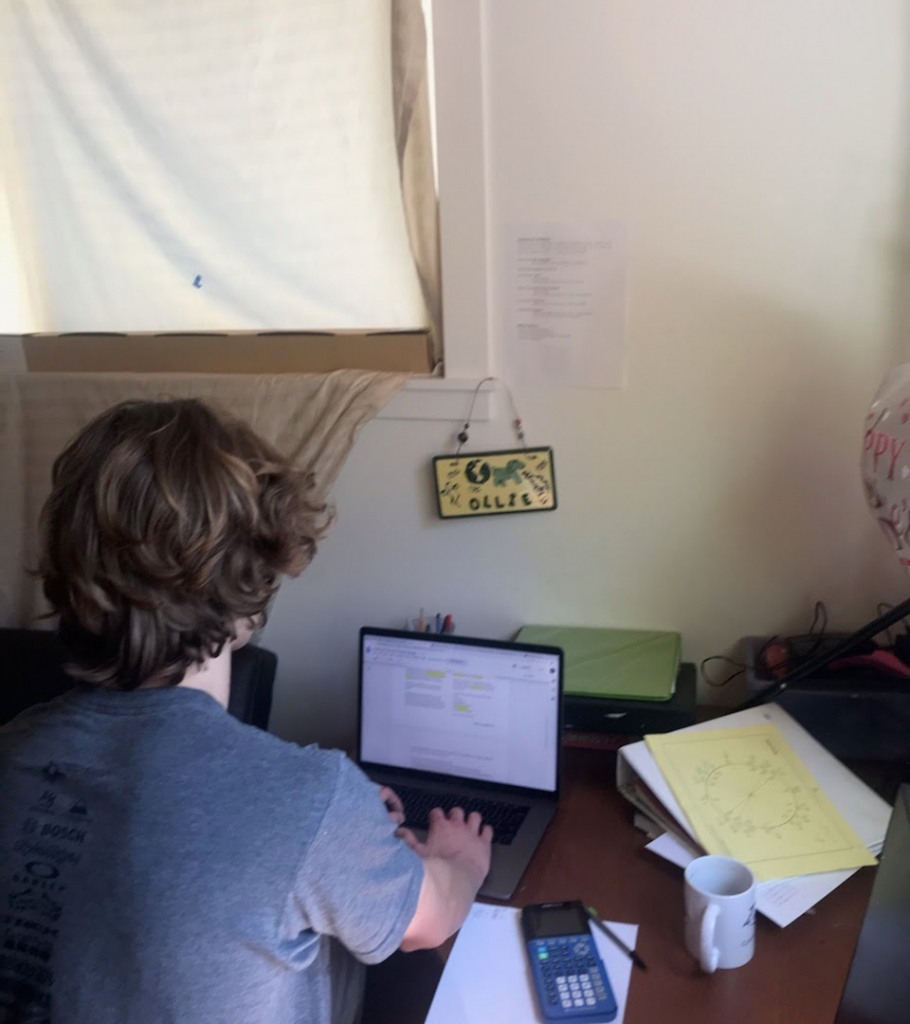
SB: Even for families who don’t have anyone sick at home, there are plenty of challenges.
I talked to Allison Guevara. She’s an education consultant and a parent on Santa Cruz’s Westside.
For the past three weeks, she’s run a local parent support group on Zoom. It’s to help families deal with the lockdown and distance learning.
Other parents have told her they’re short on food. Others are worried about how they’re going to pay rent.
ALLISON GUEVARA: You know, I’m privileged. I have, you know, my husband and I, we have secure income right now. We have secure housing, we have a kitchen full of food.
But for us, it’s just like incredibly stressful. And we are both trying to work. We have three kids, we have a 10, 7 and 1 year old. And, you know that first week, they’re like sending us home like, curriculum and assignments and like we have like a full schedule of meetings.
We have a baby. I’m nursing. And so that it’s just like like that terrible stress and panic kind of that comes up.
I think I’ve talked to other one of the moms I talked to, she’s like, I feel like I’m breathing underwater, you know, like, I can’t breathe. And so I think there’s like this whole level of just like, emotional support. And so you know, mental health support, that is just like really needed so that we can be present for our kids. And also just so we can just get through it.
And then I think once those needs are met, then we can start talking about like, Chromebooks and like curriculum and academics.
But we’re not there yet. A lot of us are not there.
It really depends on your situation.
[MUSIC]
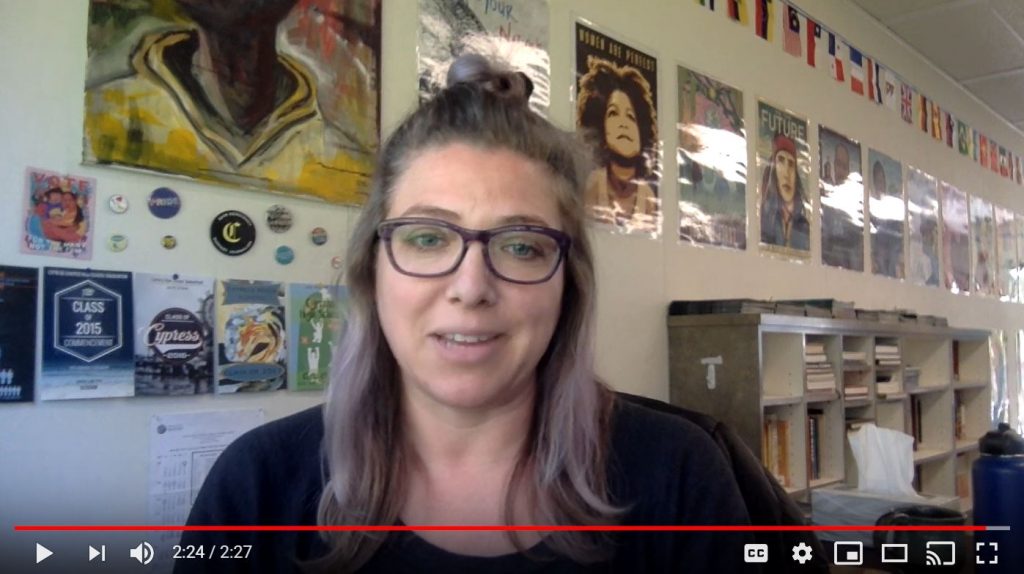
LINDSEY SMITH: Even in classes where I didn’t really assign a lot of homework, as you know, everything is homework now.
SB: That’s Lindsey Smith. She’s a teacher at Cypress Charter High School in Live Oak. I asked her for some practical tips on what’s working in her classroom.
SMITH: One of the things that we’ve done as a school to try to increase sort of the communication with students is that we, we hold virtual office hours every day, Monday through Friday, from 12 to 2 p.m.
And so during those virtual office hours, I know some teachers just have a standing like Zoom meeting that’s open and kids can join or not join.
Many of us also use Google Hangouts and some ways that we could chat with students or video chat with students. And so I’ve seen a lot of student engagement, just asking questions and checking in using that method. So I think that’s been pretty successful.
And I know some other teachers have set up like small groups and and encouraged them to do their classwork and their homework in small groups over these same kind of digital platforms. And that’s been successful as well. So they’re helping each other with their math homework.
So I think that we’re really lucky that this is happening in an era of so many great digital tools to help students engage with their learning, because if it was just take this book home and do this worksheet, I think that we would see a real drop off in engagement.
KMG: Open Zoom office hours may work for high school, but kindergarten through second grade is a whole different ball game.
Lauren Pomrantz, is a first-grade teacher at Del Mar Elementary in Live Oak.
She leads a 45 minute class every morning at 10.
LAUREN POMRANTZ: Whew! That was good exercise everybody!
[Kid: Mmm-hmm.]
Yeah. Awesome. OK. So, that’s going to be the end of our lesson today. Tomorrow we’re going to do some fun. We’re going to take a little break from our math lesson. I’m going to read a story. Give me a thumbs up if you want to do a little more “Go Noodle” together. OK, we can do that.
[POMRANTZ’S VOICE DUCKS UNDER]
KMG: On Lauren’s screen is a Brady Bunch view of her classroom. There’s 16 little squares with a view of each kid. Most of the kids are in pajamas. One girl is wearing a tiara.
Almost all of them are bouncing around. But they seem to be paying attention.
POMRANTZ: So we’ll start tomorrow with sharing. Then we’ll do some Go Noodle and then I’ll read a story. OK? I’m going to open us up for some questions. If you have some questions —
I see Ezra’s hand up. Hi Ezra.
EZRA: Um, I have Go Noodle somewhere, on my…
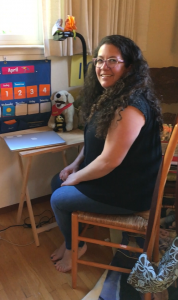
[FADE OUT]
KMG: Lauren videos in from a corner of her bedroom. She brought home the classroom calendar and their class mascot, Danny. He’s a stuffed dog.
She said those reminders of the classroom give the kids a sense of normalcy.
I asked her what’s working in her first grade classroom.
POMRANTZ: I’m just a super believer in routine even within, like your, the lesson that you teach. So, you know, as I’ve moved, as I’ve transitioned from just getting on line into the Zoom meeting, and just talking and listening to all the kids share about something, now that I’ve moved into teaching, I’m bringing back a lot of those same teaching tools that I use. So it’s they’re reminded of, ‘Oh, this is this is what we do. We do the counting, and then we do some number writing and then we do this problem and then we go.’ And they and they fall back into that routine very, very easily. So I’m just trying to keep everything as much of a routine as I can.
And also just making sure that they see me having fun, in that I think it’s really important that kids see this as not a stressful time. But that is just an opportunity to learn in a different way. And and you know, we can still have fun together in this new way.
KMG: One of the thigns that’s been working for Live Oak School District is getting Chromebooks out to their students. As of this week, all third- through eighth-grade students had those laptops. For the younger grades, the Live Oak schools foundation [Live Oak Education Foundation] is raising money to get them laptops too.
On Wednesday, more than 200 third-grade parents lined up outside Del Mar Elementary to pick up the Chromebooks for their kids. Marilyn Rockey, the principal, handed them out personally.
She spoke to each parent as they drove up. She asked them how they’re doing.
MARILYN ROCKEY: I would say, out of the probably 250 cars that rolled into our drive aisle today, I had less than 10 families tell me they’re OK right now. You know? Less than 10. So it’s — everybody’s struggling.
And a lot of it is families are conveying the message. They don’t feel they’re doing enough. They, they’re feeling like failures. They’re feeling like how can I do my job and teach at the same time because that’s not what I do. And we have families that have to leave their kids home, you know, to be watched by an older sibling and then come how do I help my kids with all the schoolwork?
So, you know, our message to all these families is: You’re enough. And we want you to take a breath and know you are enough. You’re everything your child needs right now, as long as you can be emotionally present, and just be there for them.
SB: This is the recurring theme. We heard it from all the educators we spoke to. Parents, do what you can, and don’t beat yourself up, they said.
A teacher from Pleasure Point told me: Whatever your kids are missing in school now, they can always learn later when this crisis has passed.
So the most important thing is that kids feel loved and secure.
Here’s Allison Guevara again. She’s the parent who runs the Zoom support group.
ALLISON GUEVARA: This is a radical change in our daily lives. And we really need to name it and be compassionate and understanding with each other, and with our children.
And I just think that we’re still really it’s still in the early days, and there’s still so much to learn and figure out.
[MUSIC]
KMG: In terms of how we can best serve our kids right now, there are still a lot of nuts and bolts type questions that need answers. For example: How many kids in our county still need access to computers and WiFi? And how are teachers going to navigate report cards and advancing kids to the next grade level?
The county leaders we spoke to don’t have hard answers yet.
Things are moving fast. A month ago, before the lockdown, about four out of five public school students in our county were not ready to learn at home. They either didn’t have a device or they didn’t have WiFi. That’s according to the county office of education.
Since then, tens of thousands of Chromebook laptops have been distributed to families. Internet service providers like Cruzio in Santa Cruz, and also AT&T and Spectrum have offered reduced cost connections for low-income families.
Kris Munro, the superintendent of Santa Cruz City Schools, wrote to me by email Sunday. She said her worry is not devices, but internet access. The district had ordered more than 500 WiFi hotspots, but only received about 200 so far.
As far as how the closures will impact report cards and criteria for moving up to the next grade level, the county superintendent said he’ll release the new policies in the next few weeks.
Everyone’s still figuring this out, the teachers and school administrators included.
SB: And life goes on for high school seniors.
For Nolan Haines, the Soquel High senior in isolation, at least his phone’s still lighting up.
NOLAN HAINES: Like, girls are starting to hit me up now. Like, “Hey, I thought you’re cute. And now it’s quarantine. I don’t know what to do.”
I’m like, are you serious? Now’s the time? [Laughs.]
I’m just telling them it’s a little too late because like, I don’t know, we’re all, we’re all going to college and uh, yeah I’m just not going to be an area. But I don’t know. It’s still good to get the attention. [Laughs]
[MUSIC]
SB: Sign up for our free email newsletter. We’re in your inbox two to three times a week.
Signup is at santacruzlocal DOT org.
We’re supported almost entirely by our members. Thank you to all of our members.
Thank you especially to our guardian level members: Chris Neklason, Patrick Reilly, Elizabeth and David Doolin, and the Kelley Family.
Thanks to Trimpot for the music.
Thank you for listening to Santa Cruz Local.
Stephen Baxter is a co-founder and editor of Santa Cruz Local. He covers Santa Cruz County government.
Kara Meyberg Guzman is the CEO and co-founder of Santa Cruz Local. Prior to Santa Cruz Local, she served as the Santa Cruz Sentinel’s managing editor. She has a biology degree from Stanford University and lives in Santa Cruz.



